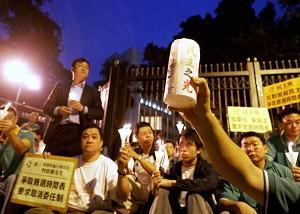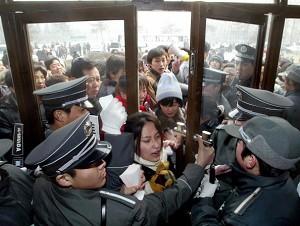HONG KONG - Up to 100,000 people are expected to march for universal suffrage in Hong Kong on Sunday to send a message to the territory’s leader, who has been pushing an election reform package opponents say is inadequate.
A large turnout could annoy Beijing and embarrass China-backed Chief Executive Donald Tsang, who has stood fast behind his reform proposals and shown little willingness to negotiate, despite widespread criticism.
“We are not just rejecting this proposal. We are wanting more,” said pro-democracy legislator Lee Cheuk-yan. “There’s no incentive for us ... to accept this proposal.”
Lee Wing-tat, chairman of the Democratic Party, said he expected between 50,000 and 100,000 people to turn out for the rally, which will start in a park and move to the heart of the city.
Half a million people attended a march on July 1, 2003, rattling the leadership in Beijing and forcing the Hong Kong government to withdraw plans to enact a controversial anti-subversion law.
Since China regained sovereignty over Hong Kong from Britain in 1997, the former colony has been ruled under a “one country, two systems” formula, which has afforded it some autonomy.
But despite widespread calls for full democracy, the Communist leadership in Beijing has been unwilling to let the people of Hong Kong decide for themselves when this should come.
“I will take part on Sunday because I want to say something to our government. I want them to move fast on democracy,” said wedding photographer Ben Li.
Student Anna Yuen said she wouldn’t attend the rally, although she agreed Hong Kong was not moving fast enough towards democracy.
“What we can do now is trust the government. What we can see is there’s definitely progress and hopefully it works sometime in the future,” she said.
Currently, Hong Kong’s chief executive is anointed by Beijing and picked by a China-backed committee of 800 electors. Only half of the members of its 60-seat legislature are directly elected.
The government’s reform plan would double the size of the Chief Executive selecting committee and add 10 seats to the Legislative Council, five of which would be directly elected.
Tsang, caught between his political masters in Beijing and public opinion in Hong Kong, argues his plan is the best way to advance democracy and rejecting it would strain ties with China.
Pro-democracy lawmakers, who have the votes to reject the package, say they will kill it unless Tsang offers a timetable for universal suffrage. But Beijing must endorse it.
In a bid to cool the atmosphere before the protest, Chinese officials invited legislators and community leaders for talks in the neighbouring Chinese city of Shenzhen on Friday.


Friends Read Free